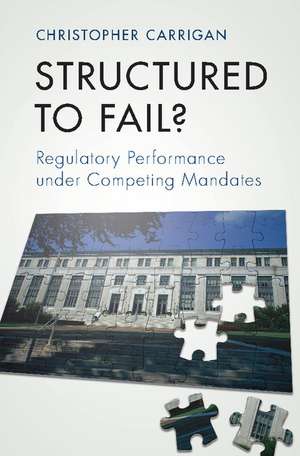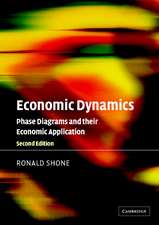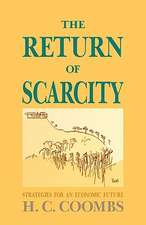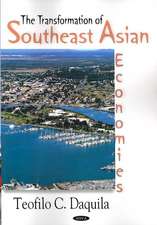Structured to Fail?: Regulatory Performance under Competing Mandates
Autor Christopher Carriganen Limba Engleză Paperback – 25 iun 2017
| Toate formatele și edițiile | Preț | Express |
|---|---|---|
| Paperback (1) | 307.91 lei 39-44 zile | |
| Cambridge University Press – 25 iun 2017 | 307.91 lei 39-44 zile | |
| Hardback (1) | 700.76 lei 6-8 săpt. | |
| Cambridge University Press – 25 iun 2017 | 700.76 lei 6-8 săpt. |
Preț: 307.91 lei
Nou
Puncte Express: 462
Preț estimativ în valută:
58.92€ • 61.40$ • 48.78£
58.92€ • 61.40$ • 48.78£
Carte tipărită la comandă
Livrare economică 31 martie-05 aprilie
Preluare comenzi: 021 569.72.76
Specificații
ISBN-13: 9781316632802
ISBN-10: 1316632806
Pagini: 336
Dimensiuni: 151 x 227 x 17 mm
Greutate: 0.48 kg
Editura: Cambridge University Press
Colecția Cambridge University Press
Locul publicării:New York, United States
ISBN-10: 1316632806
Pagini: 336
Dimensiuni: 151 x 227 x 17 mm
Greutate: 0.48 kg
Editura: Cambridge University Press
Colecția Cambridge University Press
Locul publicării:New York, United States
Cuprins
1. Linking regulatory failures to organizational design; Part I. Examining the Performance of Multiple-Purpose Regulators: 2. Isolated effects or widespread dysfunction?; 3. Appealing to goal ambiguity to explain performance; Part II. Assessing the Role of Regulatory Agency Design in the Gulf Oil Disaster: 4. Balancing conflict and coordination at MMS: 5. Politics and offshore oil and gas policy; Part III. A Theory of Multiple-Purpose Regulators: 6. Policy context and the political choice to combine purposes; 7. Operations, organization, politics, and policy context; Appendix A. Additional description and analyses for chapters 2 and 3; Appendix B. Mathematical context, derivations, and proofs for chapter 6.
Recenzii
'In skillfully presenting new theoretical and empirical findings, Christopher Carrigan persuasively challenges long-standing principles about how to organize the many regulatory authorities that oversee business behavior. This innovative book represents the most definitive treatment of the opportunities and challenges involved in structuring the missions and jurisdictions of government agencies. With careful analytical execution and often counterintuitive insight, Carrigan offers a major advance in the study of regulatory politics and public administration, with critical insights for scholars and policymakers alike.' Cary Coglianese, Edward B. Shils Professor of Law and Professor of Political Science, and Director of the Penn Program on Regulation, University of Pennsylvania
'Christopher Carrigan has produced the rarest of social science achievements: theoretically grounded, empirically rigorous scholarship that carries indispensable lessons for policymakers seeking to solve the toughest, most salient issues confronting the world today. This book should cause both researchers and practitioners to seriously reconsider what they think they know about government organizations (like the Minerals Management Service prior to the Gulf oil spill) that combine regulatory and non-regulatory objectives.' Steven J. Balla, Associate Professor of Political Science, Public Policy and Public Administration, and International Affairs, The George Washington University, Washington, DC
'Whether caught between prudential regulation and consumer protection in financial policy, between foods and medicines in health regulation, or between licensing and safety in the governance of mining, government agencies have multiple, often conflicting jobs to do. Christopher Carrigan has written the best study of this problem, one of the principal crises facing American government in this century. A necessary read for policymakers and students of government alike.' Daniel Carpenter, Allie S. Freed Professor of Government, Harvard University
'In this very interesting book, Carrigan explores the relationship between organizational design and regulatory performance. Can we design regulatory agencies to be more effective? When does it make sense to limit agencies to one key task and when to give agencies multiple missions? Deftly mixing careful theorizing and empirical research, Carrigan explains why some regulatory agencies perform poorly and what, if anything, we should do about it. It is an impressive accomplishment and a must read for those interested in regulatory politics, public administration, or public sector performance.' David E. Lewis, Chair, William R. Kenan, Jr. Professor, Department of Political Science, Vanderbilt University
'In this sophisticated yet readable volume, Professor Carrigan uses front page news events like the Deepwater Horizon spill to address important questions of government agency behavior. He highlights the crucial conclusion that seemingly obscure decisions, like how agencies are organized, can have important impacts on public policy outcomes.' Stuart Shapiro, Professor and Director, Public Policy Program, Bloustein School of Planning and Public Policy, Rutgers University, New Jersey
'Carrigan brings a deep statistical understanding of what drives successful agencies and the realization that goal ambiguity alone didn't cause regulatory failure.' Sam Batkins, Regulation
'Overall, this book is an invaluable resource for scholars and practitioners of political science, risk analysis, public policy, and public administration.' Zhoudan Xie, Risk Analysis
'Carrigan has … offered a hypothesis ready for empirical inquiry, and one that regulatory scholars are well advised to take up. The contemporary political context suggests that such research stands to make theoretically meaningful and substantively crucial contributions.' David P. Carter, Journal of Public Administration Research and Theory
'Christopher Carrigan has produced the rarest of social science achievements: theoretically grounded, empirically rigorous scholarship that carries indispensable lessons for policymakers seeking to solve the toughest, most salient issues confronting the world today. This book should cause both researchers and practitioners to seriously reconsider what they think they know about government organizations (like the Minerals Management Service prior to the Gulf oil spill) that combine regulatory and non-regulatory objectives.' Steven J. Balla, Associate Professor of Political Science, Public Policy and Public Administration, and International Affairs, The George Washington University, Washington, DC
'Whether caught between prudential regulation and consumer protection in financial policy, between foods and medicines in health regulation, or between licensing and safety in the governance of mining, government agencies have multiple, often conflicting jobs to do. Christopher Carrigan has written the best study of this problem, one of the principal crises facing American government in this century. A necessary read for policymakers and students of government alike.' Daniel Carpenter, Allie S. Freed Professor of Government, Harvard University
'In this very interesting book, Carrigan explores the relationship between organizational design and regulatory performance. Can we design regulatory agencies to be more effective? When does it make sense to limit agencies to one key task and when to give agencies multiple missions? Deftly mixing careful theorizing and empirical research, Carrigan explains why some regulatory agencies perform poorly and what, if anything, we should do about it. It is an impressive accomplishment and a must read for those interested in regulatory politics, public administration, or public sector performance.' David E. Lewis, Chair, William R. Kenan, Jr. Professor, Department of Political Science, Vanderbilt University
'In this sophisticated yet readable volume, Professor Carrigan uses front page news events like the Deepwater Horizon spill to address important questions of government agency behavior. He highlights the crucial conclusion that seemingly obscure decisions, like how agencies are organized, can have important impacts on public policy outcomes.' Stuart Shapiro, Professor and Director, Public Policy Program, Bloustein School of Planning and Public Policy, Rutgers University, New Jersey
'Carrigan brings a deep statistical understanding of what drives successful agencies and the realization that goal ambiguity alone didn't cause regulatory failure.' Sam Batkins, Regulation
'Overall, this book is an invaluable resource for scholars and practitioners of political science, risk analysis, public policy, and public administration.' Zhoudan Xie, Risk Analysis
'Carrigan has … offered a hypothesis ready for empirical inquiry, and one that regulatory scholars are well advised to take up. The contemporary political context suggests that such research stands to make theoretically meaningful and substantively crucial contributions.' David P. Carter, Journal of Public Administration Research and Theory
Notă biografică
Descriere
This book employs a diverse set of research methods to confront widely accepted principles of regulatory agency design.













